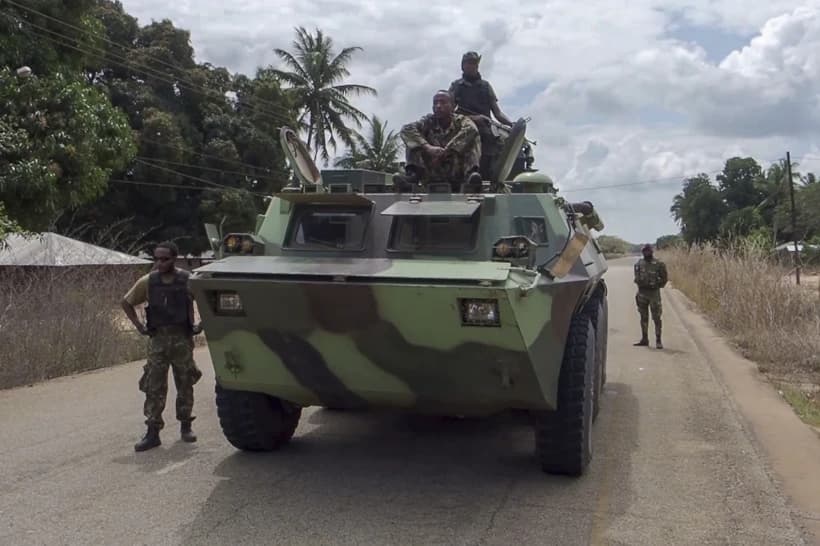YAOUNDÉ, Cameroon – African terrorism does not emerge from religious institutions as commonly portrayed, but rather from the political machinations of power brokers, says Catholic philosopher John Kanumbo.
In an article titled “Terrorism in Mozambique has an owner,” the author explains that the seven-year conflict in Mozambique’s Cabo Delgado province did not begin with the first shot fired in 2017, but rather with the discovery of gas, rubies, gold, and graphite.
According to the Armed Conflict Location and Event Data Project (ACLED), the conflict in Mozambique has led to the deaths of over 11,000 people. Nearly a million people have been displaced, half of them children. The conflict has severely impacted the lives of an estimated 1.5 million people in Cabo Delgado and surrounding areas, through destruction of homes, livelihoods (especially agriculture and fishing), infrastructure, and access to basic services.
Officially, the conflict started in 2017 with attacks led by terrorist groups like Ansar al-Sunna and Islamic State in Mozambique, aiming to establish an Islamic state.
However, Kanumbo differs from this official narrative, saying that the real story – one that no one wants to tell— is completely different.
“This war begins before the shots are fired — it begins when local communities were systematically excluded from the profits of natural resources,” he writes.
He said communities like the Mwani saw their historic ports closed to informal trade, and the Maucas were pushed to the peripheries without schools or hospitals.
“Cabo Delgado is an exemplary case of how terrorism can be manufactured, fed and instrumentalized,” Kanumbo said.
He cited the case of the Rovuma basin where enormous amounts of gas were discovered, triggering a sense of hope that the abandoned province would finally become a storehouse of hope.
“But, as in all African stories, wealth brought the curse. The multinationals arrived with the contracts. The generals arrived with their weapons. The politicians arrived with their pockets. The people? They continued without drinking water, without schools and without the right to land,” he said.
He said it was in that context of abandonment and betrayed promises that terrorism took hold. And it was not without help: There was internal betrayal. Makondes, Mwanis and Macuas were divided and pitted against each other.
And this is a reality that cuts across boundaries in Africa-a continent so rich in natural resources, but whose citizens continue to wallow under the yoke of crushing poverty.
Johan Viljoen, the director of the Denis Hurley Peace Institute of the South Africa Bishops’ Conference, told Crux that mineral deposits generally have a direct relationship with the outbreak of conflicts in Africa.
“Let me cite just three most obvious and ongoing examples at the moment. Firstly, Eastern Democratic Republic of Congo, DRC, there are vast reserves of strategic minerals there that are essential components for cell phones, laptops and so on.” He recalled that around 120 armed groups are fighting for the control of these minerals and land in that part of the continent.
“The second one obviously is Mozambique where the presence of minerals, specifically oil and gas has led to terrible conflict and then of course in Southern Sudan and Northern Sudan there are vast deposits of minerals and the fighting is continuing,” he told Crux.
“A prime example of conflict erupting after oil and gas discovery is TotalEnergies in Mozambique’s Cabo Delgado province. Now, similar large deposits south of Cabo Delgado, in Angoche (Nampula province), are attracting ExxonMobil and ENI prospecting. Communities there fear this new activity will spark the same devastating conflict and violence seen in Cabo Delgado,” he explained.
Rude Matinada, a lecturer at the Catholic University of Mozambique suggested that the Mozambique military is complicit in all of this, “protecting the evildoers rather than the suffering masses.”
In his article, Kanumbo notes that this reality makes it hard for anyone to ask what he calls “the most dangerous question” in Mozambique: “Who are the terrorists?”
Kanumbo suggests the answer is never simple because war itself has become a business. While armed groups with religious motivations certainly exist, they are just one piece of a complex puzzle that includes criminal networks, war brokers, private security companies, and politicians profiting from displacement.
He said true terrorism, “wears uniforms, signs contracts, and flies business class.”
Corrupt elites, he continued, use war to divert funds and justify emergency powers; multinationals benefit from “military zones” where no resistance is possible; arms dealers profit from selling weapons to both sides; and private security companies protect foreign interests rather than Mozambican lives.
“In this theater of conflict, everyone benefits except the people, making terrorism merely another tool of social and economic engineering,” Kanumbo said.
He described terrorism as “the new colonialism,” which he said is invisible, disguised, outsourced.
“The enemy no longer comes on slave ships. He comes on NGO planes. He no longer imposes crosses. He imposes debts. He no longer builds churches, he builds extraction platforms. He no longer wears cassocks, he uses technical reports,” Kumnuno said.
And as the real terrorists make away with the country’s wealth, the “new enslaved “Africans are “being pushed into mass graves.”
“If the people do not regain their dignity, the whole country will be sold in parcels, like meat in the butcher’s shop,” the Catholic thinker wrote.













